Workforce Development: Providing Pathways Out of Hunger
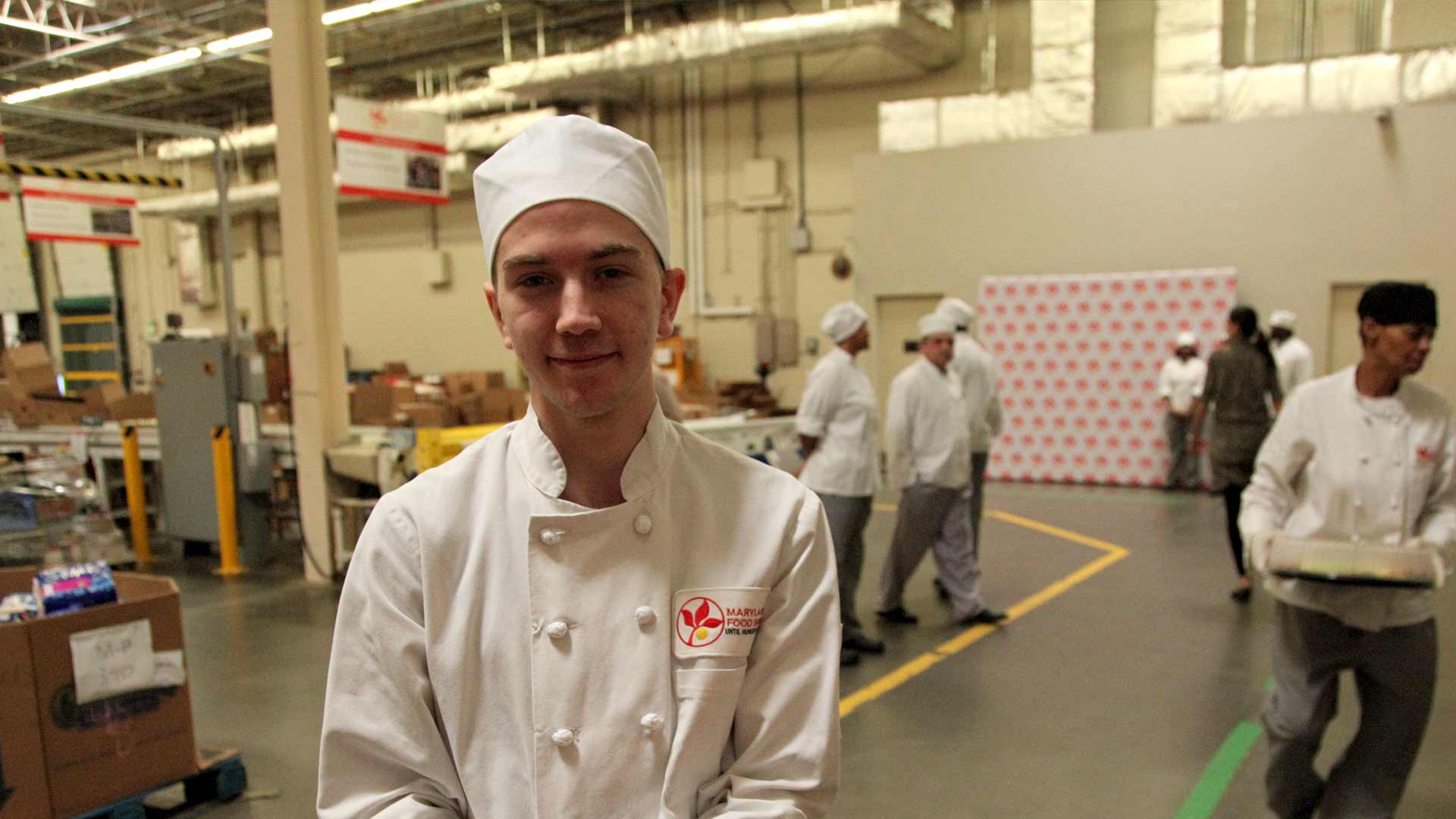
Workforce development has the power to transform lives. At the Maryland Food Bank, we see it every day through our FoodWorks culinary training program.
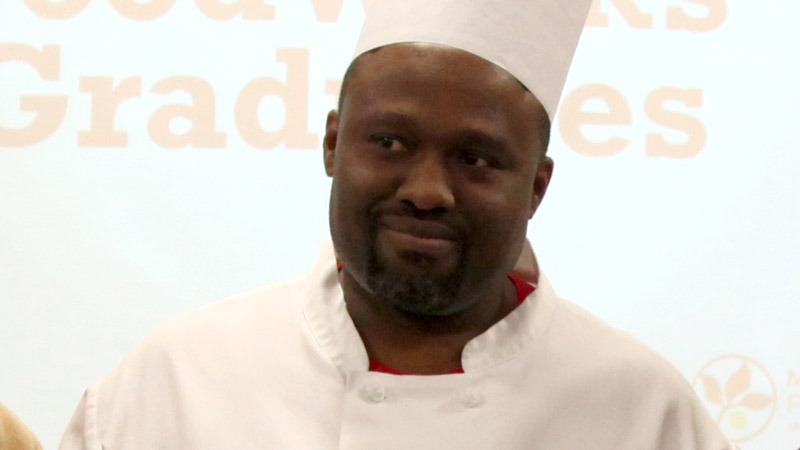
“I went from being homeless to the Executive Chef at Papa’s Smokehouse. I feel really blessed to have been allowed to be in the FoodWorks program, and to learn from Chef Manny. FoodWorks changed my life completely, and that’s the truth.”
Since 2010, hundreds of Marylanders like Ron have found their own pathways out of hunger with the help of FoodWorks, a workforce development program that focuses on people in an effort to open doors that lead to social and economic prosperity.
Cooking Up A Workforce Development Program at MFB
“It takes more than food to end hunger,” said Tim Regan, FoodWorks’ executive director. “At the Maryland Food Bank, we know that lack of employment and under-employment are common root causes of hunger. That’s why we’re investing in Food Works, our workforce development as a real solution for Marylanders who struggle to make ends meet.”
FoodWorks is an intense 12-week culinary training program that offers a fresh start for roughly 100 low-income students each year. Through a unique collaboration with the Community College of Baltimore County (CCBC), FoodWorks students learn basic cooking skills while converting fresh produce and other perishable foods into healthy meals for distribution to those in need.
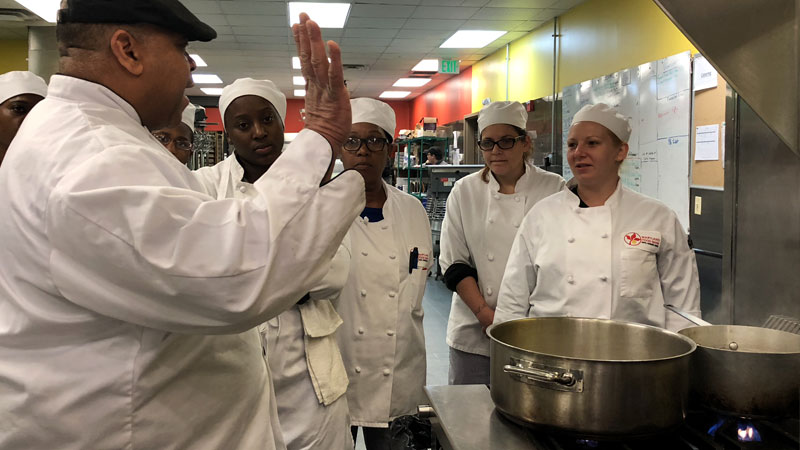
“Most of our students come from backgrounds with some barriers—homelessness, substance abuse issues, prison background, domestic abuse—and we try to lower those barriers that have created challenges in building a career.”
How FoodWorks Works for Students and Hungry Marylanders
“FoodWorks is the Maryland Food Bank’s workforce development program that’s changing the lives of people who are food insecure by training them in the culinary field and helping them secure jobs,” Regan.
In partnership with CCBC, students complete 297 academic hours plus 183 hours of on-the-job training. From kitchen preparation and lectures, to preparing meals and learning about job readiness and life skills, the curriculum is varied, comprehensive, and really challenges a student’s ability to juggle multiple responsibilities, a skill that is required for a successful culinary career.
FoodWorks encompasses three areas:
- Culinary Training
- MFB Kids Programs Meal Production
- Catering and Prepared Foods for Sale
Change happens the moment FoodWorks students walk in to the Charles T. Bauer Community Kitchen. The students begin their transformation into chefs, while transforming donated perishable food into nutritious homemade meals for hungry Marylanders.
Sometimes these meals are bulk packaged and distributed through our Network Partners, while others find their way to some of our state most vulnerable residents, children. At about week three of the program, students have achieved a level of skill and food safety knowledge that allows them to further their expertise by creating meals for food-insecure children in Maryland.
These meals are distributed to kids through our Summer and Supper Club Programs at more than 50 sites around the city and central Maryland.
In addition, we run a catering business that provides meals for business meetings and conferences, while prepared meals made in our community kitchen are sold at the Salvation Army’s DMG Foods store in Charles Village.
Both social enterprises help support our ability to train students while generating revenue that will help further fund MFB’s mission to end hunger in Maryland.
Why Workforce Development Program is Worth the Investment
“This program really works. If you really want a career in the culinary field and you come here, you will be supported,” said Darcy Sullivan, the FoodWorks employment specialist. Sullivan has a dual role with both MFB and the workforce division of Goodwill, in which she offers an abundance of resources and connections for the food bank and FoodWorks graduates.
Since 2015, Executive Chef and Director of Culinary Arts, Emmanuel Robinson (better known around here as “Chef Manny”), has been spearheading the program’s curriculum development, lectures, live kitchen demos, life lessons, and everything else that happens in our Bauer Community Kitchen.
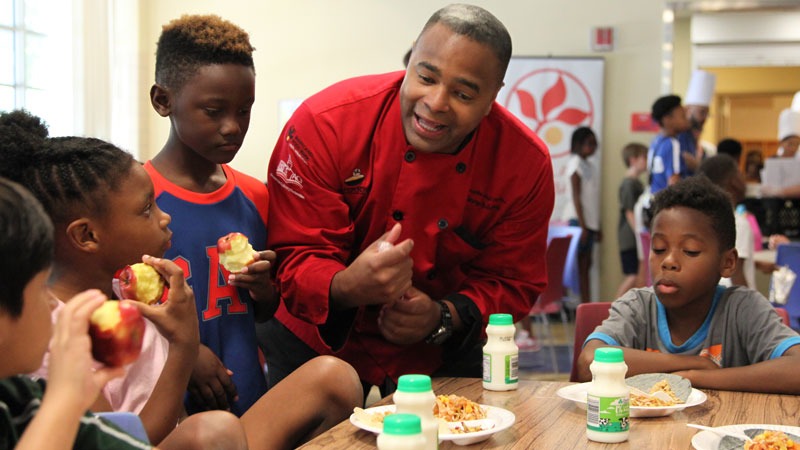
Chef Manny is supported by a robust team that includes Regan, Sullivan, and various chefs, cooks, and drivers who deliver meals prepared by the students. Many employees are graduates of the FoodWorks program who demonstrated exemplary commitment to their craft and shared a passion for supporting the mission of the Maryland Food Bank to end hunger.
“We are all incredibly passionate about what we do, and we work a ton of hours because we really want our students to succeed,” Sullivan said.
Limitless Opportunities
While we’re extremely proud of the success of our workforce development program, we’re always looking for ways to impact the lives of even more Marylanders in need.
“The more people we can train, the more lives we can change,” said Regan. “The culinary and hospitality industries have an unlimited supply of opportunities. There are all kinds of jobs available, but what’s lacking are people who are prepared to take those jobs.”
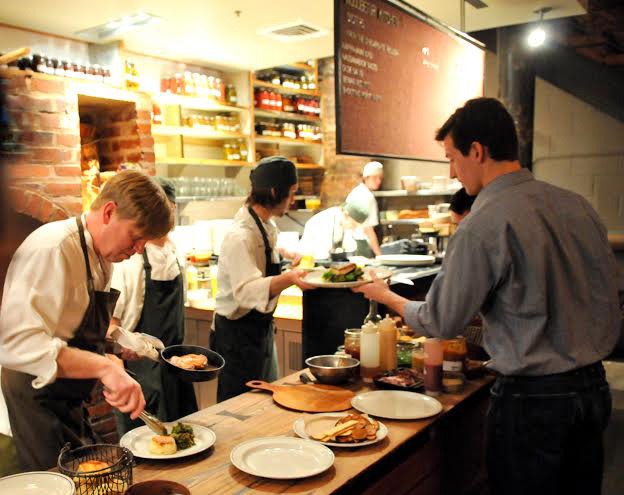
With guidance and support from the Maryland Food Bank, FoodWorks graduates have been hired at leading restaurants and institutional caterers, including Woodberry Kitchen, the Horseshoe Casino, Compass group, The SEED School, and Baltimore County Public Schools. FoodWorks graduates earn well above the minimum wage.
More Than Training in the Kitchen
When asked about the 12-week program, Chef Manny often says, “we’re not training students for jobs; we’re training them for careers.”
While that may seem like a marketing slogan, it is much more. It is the guiding principal behind FoodWorks.
The FoodWorks curriculum focuses on developing a number of job-readiness skills in addition to technical culinary skills. Staff helps students write resumes, hold mock interviews, and help them find employment after completion of the program. Students also learn invaluable skills like financial planning, as well as problem solving and conflict resolution.
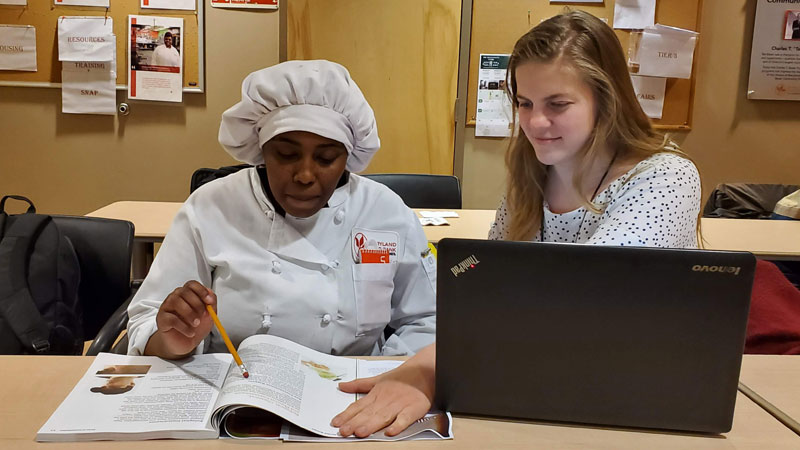
All the while, Chef Manny ensures students remember how important their work is.
“I push the students. I let them know each day that when we take the foot off the gas pedal, that means a family may not eat,” Chef Manny added.
The Power of Showing Up
FoodWorks stands apart from other workforce development programs in the region because of our commitment to helping our students develop interpersonal skills that will translate into all areas of their lives.
“What we hear over and over again from employers is that they are looking for people who want to work, who are consistent, and who have the life skills to show up day after day after day. Throughout the 12 weeks that the students are in the program, yes, they are getting a large variety of culinary skills, but it’s what they’re learning by just being here every day, collaborating well with others and showing up in uniform every day,” Regan said.
Chef Josh Distenfeld, the Executive Chef at Centerplate, the Baltimore Convention Center’s catering company, is one of those employers.
“I’ve had a lot of people come in here, and they expect things to be handed to them. FoodWorks graduates are different – they took a big step to better themselves, and it shows. They want to work; they want to earn it – those are kind of people I want here.”
People like Pria Jones-Smith, a graduate of FoodWorks Class 30.
“Pria is just fantastic. She really works well with others, and showed an interest in making pastries,” said Chef Josh. “She saw an opportunity, embraced it, and her career has really taken off.”
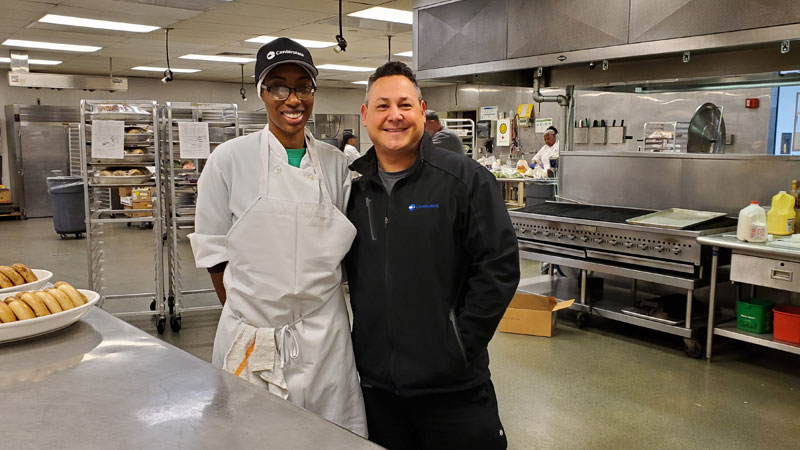
FoodWorks Success Stories
A 36-year-old from the streets who never had a job in his life is now employed at BWI Airport. A student whose troubled background led to jobs far beneath his skill level is now an executive chef. A woman who was in and out of shelters graduated at the top of her class and most recently works at Woodberry Kitchen.
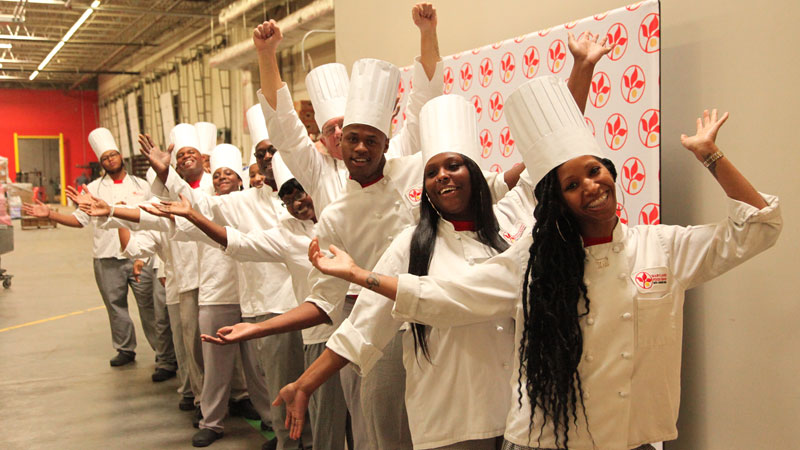
There are countless FoodWorks success stories, but one in particular remains front of mind for Chef Manny.
“We had a young lady that came to us lacking transferrable skills, hopping from job to job, sometimes ten jobs in one year. She had childcare issues and many other barriers to employment stacked against her,” said Chef Manny. “She was going to quit FoodWorks three times, but she made it through, and we helped her get a job working for Baltimore County Public Schools. Her supervisor sent an email asking for more students just like her!”
After only a year and half after graduation, this former student is now running the cafeteria in a high school.
Help Us Open More Life-Changing Pathways out of Hunger
We know that it takes more than food to end hunger.
Ensuring that food-insecure Marylanders have the skills and resources that they need to find a job—and stay employed—requires us to keep expanding our facilities, our expertise, and our partnerships.
Workforce development is a key tool for us to open pathways out of hunger for more Marylanders.
“To have a sustainable career,” said Chef Manny, “you need a balance of interpersonal and technical culinary skills to be a success.”
“There’s that old proverb ‘If you give a person a fish, they can eat for a day. If you teach a person how to fish, they can eat for a lifetime,’” remarked Chef Manny. At FoodWorks, we like to add ‘but if you teach a person how to prepare a fish, they can cook for a living.”
Together, we can help more Marylanders forge pathways out of hunger through workforce development programs like FoodWorks.







